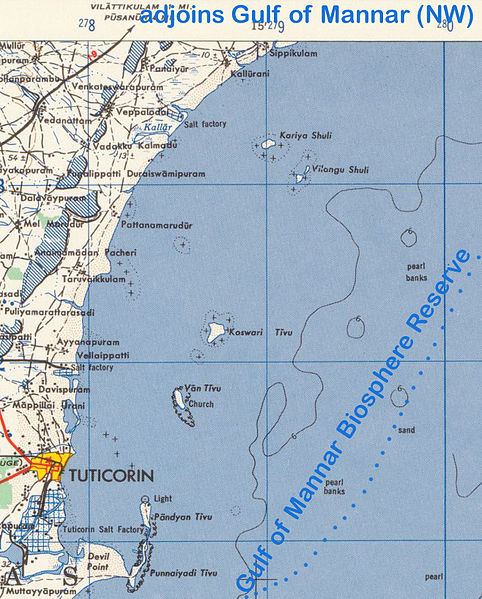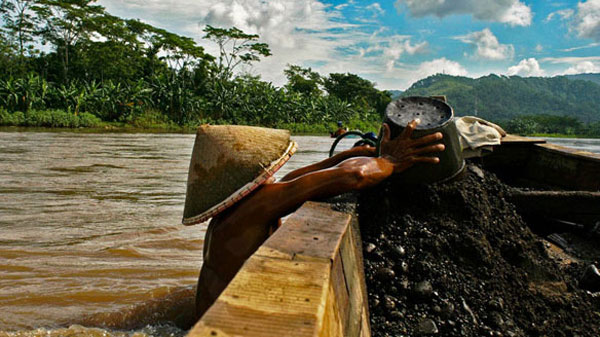Two small islands have sunk into the sea between India and Sri Lanka

Two small islands in South Asia’s first marine biosphere reserve have sunk into the sea primarily as a result of coral reef mining. The islets were in a group in the Gulf of Mannar, between India and Sri Lanka.
The Indo-Pacific region is considered to contain some of the world’s richest marine biological resources. The group’s 21 islands and islets are protected as part of the Gulf of Mannar Marine National Park, covering an area of nearly 560 sq km (216 sq miles).
Fishermen had indiscriminately and illegally mined invaluable coral reefs around the islets of Poomarichan and Villanguchalli for many decades. Rising sea level as a result of global warming was also a factor behind the islands’ submergence.
Though these islets were only 3-5m (10-15 ft) above sea level, their submergence sounded an alarm bell about the danger many more small islands faced in the long run, according to Mr Balaji, who is also director of the Gulf of Mannar Biosphere Reserve Trust (GOMBRT).

The Gulf of Mannar was chosen as a biosphere reserve by the Indian government in 1989 because of its biological and ecological uniqueness, and the distinctive socio-economic and cultural profile shaped by its geography. Most of the 21 islands are uninhabited, and the corals were mined for use as a binding material in the construction industry, as they were rich in calcium carbonate.
The biosphere reserve is a storehouse of about 3,600 species of marine flora and fauna. The loss of these two islands should be a “wake-up call” for all those in the entire Asia-Pacific region. Though the lost islets were small, a similar fate may happen to larger islands in the long run as a result of global warming coupled with large scale mining. Losing the reefs may result in migration of fish populations to other regions, which would result in loss of the gulf’s biodiversity.
With the threat of climate change in years to come, factors such as coral mining will have an accelerating effects on the submergence of many island. People in the area have gone on record many times as saying that the coral reefs in the Gulf of Mannar saved them from destruction when the devastating tsunami struck in December 2004. Experts also point out the need to keep the remaining 19 islands and islets “pristine” in order to offer them some protection them from processes such as climate change.
The Indian National Oceanographic Institute point out that very few of the islands and islets in the gulf are in good shape. Collection of coral by students for research over many decades, and heavy industrial pollution caused by onshore industries, have inflicted an irreversible damage to the coral reefs in this unique marine biosphere. (BBC)


While the Earth has always endured natural climate change variability, we are now facing the possibility of irreversible climate change in the near future. The increase of greenhouse gases in the Earth?s atmosphere from industrial processes has enhanced the natural greenhouse effect. This in turn has accentuated the greenhouse ?trap? effect, causing greenhouse gases to form a blanket around the Earth, inhibiting the sun?s heat from leaving the outer atmosphere. This increase of greenhouse gases is causing an additional warming of the Earth?s surface and atmosphere. A direct consequence of this is sea-level rise expansion, which is primarily due to the thermal expansion of oceans (water expands when heated), inducing the melting of ice sheets as global surface temperature increases.
Forecasts for climate change by the 2,000 scientists on the United Nations Intergovernmental Panel on Climate Change (IPCC) project a rise in the global average surface temperature by 1.4 to 5.8°C from 1990 to 2100. This will result in a global mean sea level rise by an average of 5 mm per year over the next 100 years. Consequently, human-induced climate change will have ?deleterious effects? on ecosystems, socio-economic systems and human welfare.
At the moment, especially high risks associated with the rise of the oceans are having a particular impact on the two archipelagic states of Western Polynesia: Tuvalu and Kiribati. According to UN forecasts, they may be completely inundated by the rising waters of the Pacific by 2050.
According to the vast majority of scientific investigations, warming waters and the melting of polar and high-elevation ice worldwide will steadily raise sea levels. This will likely drive people off islands first by spoiling the fresh groundwater, which will kill most land plants and leave no potable water for humans and their livestock. Low-lying island states like Kiribati, Tuvalu, the Marshall Islands and the Maldives are the most prominent nations threatened in this way.
“The biggest challenge is to preserve their nationality without a territory,” said Bogumil Terminski. The best solution is continue to recognize deterritorialized states as a normal states in public international law.
Thanks